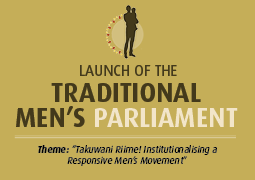
Parliament has collaborated with the National House of Traditional and Khoi-San Leaders (NHTL), the Department of Social Development, the South African National Aids Council and the Takuwani Riime Men’s Movement to launch the Traditional Men’s Parliament in an effort to tackle gender-based violence and end those cultural practices that are prejudiced against women.
The hybrid launch was attended by the Deputy Speaker of the National Assembly Mr Lechesa Tsenoli; the Chairperson of the National Council of Provinces (NCOP) Ms Sylvia Lucas; the Acting Chairperson of the NHTL Nkosikazi Nomandla Mhlauli; and the President of the Congress of Traditional Leaders of South Africa (Contralesa) Kgoshi Mathupa Mokoena.
The government was represented by the Minister of Cooperative Governance and Traditional Affairs Dr Nkosasana Dlamini-Zuma, her deputy Mr Obed Bapela and the Deputy Minister of Social Development Ms Hendrietta Bogopane-Zulu.
Nkosikazi Mhlauli said the launch is an important intervention in the fight against gender-based violence, which she described as the third pandemic after HIV and the coronavirus. “Traditional leaders were accused of promoting cultural practices that oppressed women. We are here today to declare as traditional leaders that we have taken a stand to discourage harmful cultural practices that discriminated against women”, she said.
She also announced that the launch of the national Traditional Men’s Parliament will be followed by more launches at provincial, regional and local levels, aiming to reach every corner of South Africa to mobilise men to stand up against the abuse of women. “Gender-based violence can be ended when men stand up and say ‘enough is enough, not in our name’. A good nation is judged by the way it treats its women and children,” said Nkosikazi Mhlauli.
Deputy Minister Bogopane-Zulu also committed her support for the Traditional Men’s Parliament and said it will join forces with other projects her department is working on, such as the Men Championing Change, the Boys Assembly and the fight against alcohol and substance abuse.
“We are building community care centres across the country in deep rural areas under traditional leadership. We are also promoting community-based intervention and rehabilitation led by Amakhosi,” the Deputy Minister said.
Other dignitaries presented messages of support during the launch, including South Africa’s Resident Coordinator of the United Nations (UN), Ms Nardos Bekele-Thomas. She commended the Traditional Men’s Parliament initiative and encouraged stakeholders to challenge norms and social stereotypes that lead to gender-based violence, such as sexism and patriarchy.
“Toxic masculinity must be removed at the roots before young boys grow to become toxic men and the solution lies in how we inculcate social values. Let us not tolerate jokes that promote sexism and gender violence,” said the UN representative.
Participants at the launch also called on culture to grow with modernity and challenged “backward” cultural practices such as ukuthwala (forced marriage), female genital mutilation, ukungena (man imposed on widow), and called for the Traditional Men’s Parliament to identify all discriminatory cultural practices.
The Deputy Chairperson of the NCOP Ms Sylvia Lucas told the attendants that sectoral parliaments have grown over the years since 2004, providing strategic areas of engagement, and affording Parliament the opportunity to critically assess the progress made in pursuing and attaining the precept of South Africa’s developmental state. “Through the Traditional Men’s Parliament we acknowledge the strategic and multifaceted role that must be played by our traditional councils to advance development and to meaningfully address the social and economic issues that particularly our rural communities continue to contend with,” she said.
She also reported that through the sectoral parliaments programme, Parliament has been able to measure impact and assess implementation, progress and whether government interventions have had the desired impact in communities. “Sectoral parliaments represent a key component of the legislative sector’s oversight and public participation machinery. To this end, the Traditional Men’s Parliament fits squarely in this broader framework of engagement which is driven by a commitment to engage all sectors of society across all spheres for purposes of advancing transformation,” Ms Lucas explained.
In supporting the launch of the Traditional Men’s Parliament, the Minister of Cogta Dr Dlamini-Zuma called on men to be agents of change and integral partners in socio-economic development of communities, improving health and preventing the scourge of gender-based violence, femicide and other social ills.
“We call on this Parliament and the entire institution of traditional leadership to work with us in getting more men to come and vaccinate (for Covid-19), because it is unfortunately more women who are vaccinating and men seem to be bit hesitant.”
The Minister also urged men to be at the forefront of fighting gender-based violence by consciously deciding to never harm a woman or a child in their life. “We call on all of you as male traditional leaders to work with us in fighting the scourge, because it is only through a multi-faceted response that includes all sectors of society that we will be able to succeed,” she said.
Sakhile Mokoena
20 September 2021

